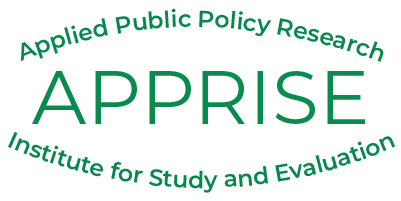RESEARCH ACTIVITIES
APPRISE conducts research and evaluation to provide program managers and policymakers with information to develop and improve public programs. The following links provide detailed information on individual research techniques and specific projects where we have applied those methodologies.
- Process Evaluation Research: This research includes review of program documents; interviews and surveys with program managers, staff, participants, nonparticipants, and other program actors; observations of program intake and service delivery; and inspections of completed services. The research provides an understanding of program design, implementation, challenges, and opportunities.
- Impact Evaluation Research: This research involves statistical analysis of energy usage, energy demand, billing, payment, and collections data to estimate the impact of energy efficiency and energy affordability programs.
- Data Tracking Research: This research includes analysis of data needed for management, operations, reporting, and evaluation; review of existing data systems; and development of recommendations for improvements to existing data systems to facilitate program functions.
- Survey Research: Surveys and in-depth interviews are conducted with program administrators, contractors, participants, nonparticipants and other market actors. The collected data provide information on market characteristics, motivation for program participation, program implementation, satisfaction, and impacts including non-energy impacts.
- Needs Assessment: This research defines the size of the eligible program populations and participation rates by population segments. The research can help policy makers and program managers to target outreach and allocate resources more effectively to reach and serve their eligible populations.
- Economic and Policy Analysis: Our analyses include estimating the impact of a program on economic activity in a state or region; reviewing program design options and outcomes; analyzing publicly available data to explore policy issues and recommend approaches; or reviewing literature for background information on policy issues. APPRISE utilizes these analyses to provide program administrations and decision-makers with information and recommendations about program policies, design, and impact.
- Non-Energy Impact Analysis: Energy efficiency and renewable energy programs lead to substantial benefits beyond the energy and demand savings they achieve. These Non-Energy Impacts (NEIs) are important to understand and measure to accurately assess cost-effectiveness and effectively market the program to potential participants. Our analyses include estimating the impact of a program on the health and safety of the home, the comfort of the home, energy affordability, economic activity in a state or region; the number of jobs created, and reductions in air pollutants.
- Performance Measurement: Metrics developed through this work systematically assess program performance, trends in performance over time, and differences in performance for specific program components. A cycle of research, program refinement, and evaluation can result in continued improvement in program outcomes.
- Technical Assistance: APPRISE assistance helps program managers and policymakers make informed policy decisions when designing and refining public programs. Our work includes technical review of program components and recommendations for design options and procedures.
